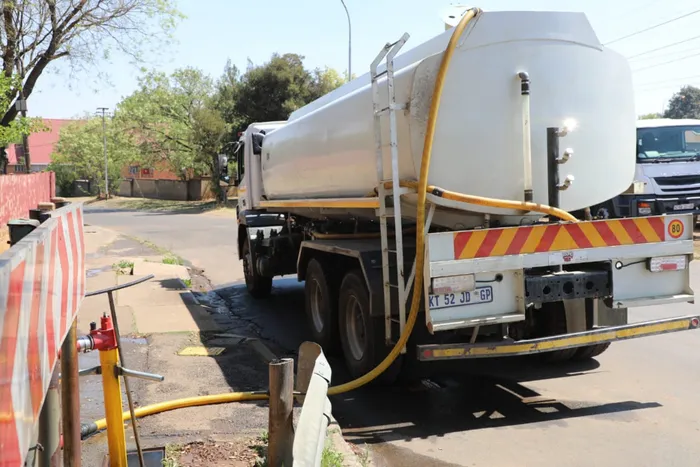Water tankers not sustainable solution to plight of people in informal settlements, says EFF

The EFF in Tshwane has called for the municipality to seek for a permanent solution and not to depend on temporary measures such as water tankers to address the plight of people living without running water in informal settlements. Picture: Timothy Bernard / African News Agency (ANA)
The EFF in Tshwane has called for the municipality to seek for a permanent solution and not to depend on temporary measures such as water tankers to address the plight of people living without running water in informal settlements.
The call was made in the wake of the cancellation of a multimillion rand tender for water tankers amid suspicions of possible corruption in awarding the process.
This week, MMC for Finance, Jacqui Uys, said the City cancelled the tender after newly implemented corruption-detection mechanisms in the supply chain processes flagged that there was a leak of valuation documentation and a possible compromise in the tender specifications.
The tender was advertised earlier this year to appoint a panel for the supply of water tankers as rudimentary services in informal areas.
Uys said the tender specifications would be reworked and the tender re-advertised.
EFF regional chairperson Obakeng Ramabodu said: “The time has come for the City to prioritise the development of sustainable infrastructure, including boreholes and purification systems, that can provide a permanent solution to the pressing issue of water scarcity.”
While the party welcomed the tender cancellation, it also took a swipe at the DA and ActionSA for misallocation of funds during the recent passing of budget for the 2024/2025 financial year.
Ramabodu said the funds misallocation raises concerns about potential corruption and mismanagement within the municipality.
“The EFF in Tshwane welcomes the decision by the City of Tshwane to cancel the exorbitant tender for water tankers, which included an allocation of R270 million. This move comes in the wake of the EFF rejecting the budget that was passed by the DA and ActionSA, where an alarming R84.5m was earmarked for consulting services,” he said.
Both allocations of R270m for water tankers and R84.5m for consulting services, the EFF said, underscored the misplaced priorities of the current administration.
“By addressing these discrepancies and redirecting resources towards sustainable solutions, such as boreholes and purification systems, we can ensure equitable access to clean water for all residents of Tshwane, particularly those in informal settlements who have long been neglected,” Ramabodu said.
He said investing in long-term solutions would ensure access to clean water for all residents in addition to mitigating the risks associated with dependency on costly and inefficient short-term interventions.
“By proactively addressing the root causes of the water crisis and investing in infrastructure that can withstand the test of time, we pave the way for a future where access to clean water is not a privilege but a fundamental right,”he said.
Pretoria News
rapula.moatshe@inl.co.za
Related Topics: